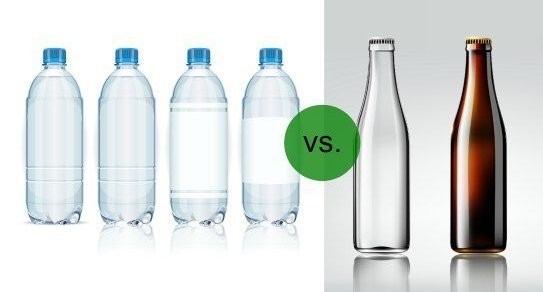
In daily life, we often encounter two common packaging materials, glass bottles and plastic bottles, especially in the food, beverage, and cosmetics industries, where their use is very extensive. With the increasing awareness of environmental protection, consumers and businesses are paying more and more attention to the impact of these packaging materials on the environment. Today, we will compare glass bottles and plastic bottles from multiple perspectives to help you better understand their advantages and disadvantages and make more responsible choices.
1.Environmental performance: Glass bottles have better sustainability than others
Glass bottles are known as one of the most environmentally friendly packaging materials. As a natural material, glass bottles can be 100% recycled without any loss of quality during the recycling process. Every year, a large number of glass bottles are successfully recycled and reused worldwide, greatly reducing the consumption of new materials. Meanwhile, glass bottles do not release harmful substances or chemical residues, making them harmless to the environment and human health. Even if exposed to the environment for a long time, glass bottles will not decompose into microplastics like plastic bottles.
In contrast, although plastic bottles can also be recycled, the recycling rate is relatively low. According to statistics, only about 9% of plastic worldwide is successfully recycled. The recycling process of plastic bottles often leads to a decrease in their quality and is difficult to recycle multiple times like glass bottles. In addition, the degradation time of plastic bottles is extremely long, and some plastic bottles may take hundreds of years to completely decompose in the natural environment. During this process, plastic bottles may also cause pollution to water sources and soil.
2. Material properties: Glass bottles are more stable, while plastic bottles are lighter
One of the biggest advantages of glass bottles is their chemical stability. Glass does not react with the contents of the bottle, making it suitable for packaging food and beverages that are prone to contamination or spoilage, such as juices, sauces, beer, etc. Glass bottles can also maintain the original flavor of their contents, avoiding chemical reactions or "plastic odors" that may occur like plastic bottles. In addition, glass bottles have stronger high-temperature resistance and can be used in environments such as hot water and microwave ovens.
However, plastic bottles are relatively inferior in these aspects. The material of plastic bottles is usually susceptible to temperature changes, ultraviolet radiation, or other external factors that can cause a decrease in the flavor or quality of the contents inside the bottle. Although many plastic bottles have been improved with UV resistant additives, their chemical stability and freshness retention are still weaker compared to glass bottles.
However, another advantage of plastic bottles is that they are lightweight and easy to carry. Compared to glass bottles, plastic bottles are lighter in weight and therefore have lower transportation costs, making them more advantageous in the fields of bulk commodities and fast-moving consumer goods, especially when large quantities of transportation are required.
3. Consumer preference: With increasing environmental awareness, glass bottles are gradually becoming the preferred choice
With the continuous improvement of environmental awareness, more and more consumers are beginning to favor glass bottles. Some brands emphasize the environmental friendliness and high-end feel of their glass bottle packaging in marketing, attracting consumers who value sustainable development and healthy lifestyles. For example, brands in the high-end beverage, brewing, and beauty industries often prefer to use glass bottles as packaging materials to enhance product added value and consumer brand loyalty.
However, in daily life, many consumers still tend to choose plastic bottles that are cheaper and more convenient to use, especially in the fast-moving consumer goods field such as sports drinks and bottled water. The portability and lower price of plastic bottles make them the preferred choice for many consumers.
Glass bottles and plastic bottles have their own advantages.When choosing between glass or plastic bottles, different needs can lead to different choices.